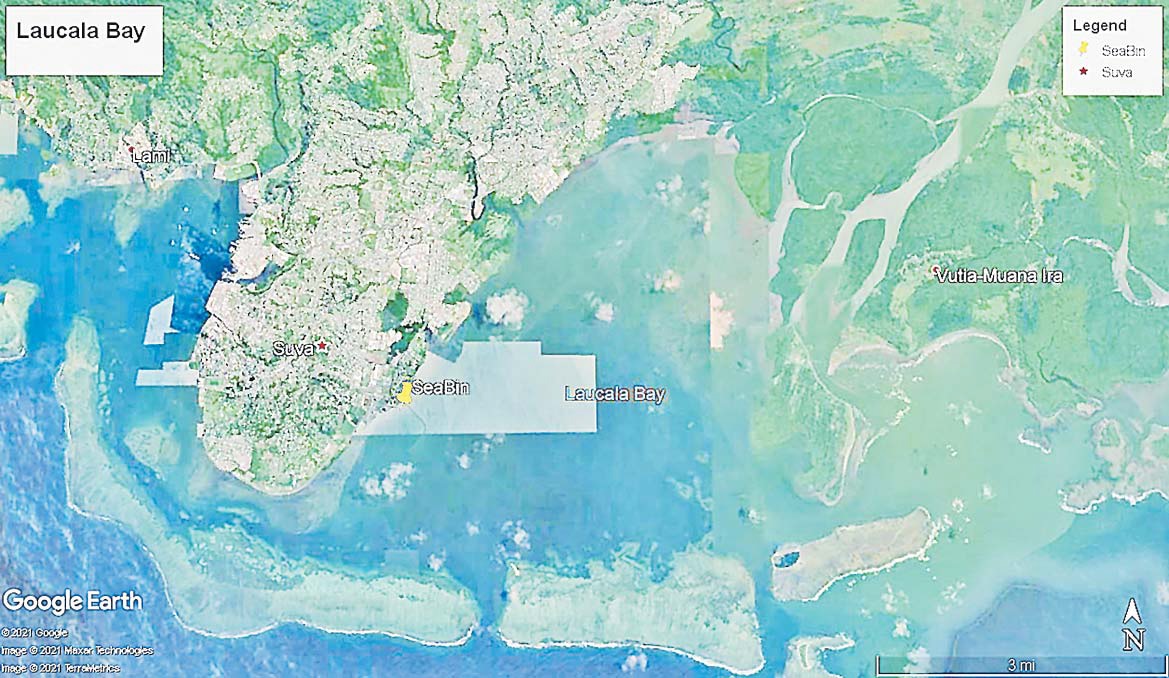Noticing the tide had begun to drop, he quickly made for the lineup behind the breakers, but in his way was a refrigerator, a television and a bucket, and several juice bottles. Turning to his left, while he bobbed up on a wave, he noticed an unbroken trail of trash leading from the Suva harbour snaking a path to the edge of the passage.
By the time he had cleared a path through the debris, the set had passed and the ocean was calm again. He sat upright on his board and thought about what he had just seen. This was not the first time it had happened, but it was happening often now.
The trash was as permanent a fixture here as the derelict lighthouse. By the time the water had drained off the reef, he was high and dry, perched in front of his laptop relaying his concerns and a possible solution via email to whomever he thought could help.
Fast-forward for several months and here we are on Zoom. Carl (along with fellow Australian athlete Natalie Cook from the World Olympians Association and peers) have founded an NGO called AFTER (athletes For The Environment). Also, on the call is Bing Gibson, an avid local surfer based in Australia, Dr Chinthaka Hewawitharana a marine lecturer at the regional university, and marine pollution researcher Andrew Paris.
The coincidences leading to this call are too numerous to mention, but here we are and as we share our concerns about the amount of trash in the Suva Harbour, Bing mentions he has this new floating rubbish bin thingamajig sitting idle in Nadi.
Present Day: It is exactly 10 months since the first Zoom call and I present to you the results of the first study of floating debris in the Laucala Bay collected by the SeaBin. It has been four years since Carl hopped out of the water and about 10 months since my research on the growing concentration of microplastics in the ocean around Suva has been published. For Bing and Dr Chin, it has been a lifelong journey of action, education, and advocacy to heal the ocean that has led to this moment. A recent addition to the project team is a postgraduate researcher and our fellow Melanesian brother from the Solomon Islands, Alex Kwaoga who played a vital role in conducting the research.
The Seabin is a floating garbage bin with an electric-powered vacuum pump that has to be mounted on a pontoon and was run over a period of 26 days from October 2 to 27, 2020, for six hours a day. After every tidal cycle, the catch bag, which collected the litter, was removed and the contents examined.
In summary, our study revealed, the SeaBin filtered 3,900,000 litres (about the equivalent volume of the Olympic pool) of seawater and collected a total amount of 274 plastic items with a total weight of 353.4grams. Of these items collected, there were 107 plastic bags/wrappers, three PET bottles, 114 microplastics, 45 pieces of nylon line, two styrofoam takeaway boxes, and three pieces of latex (most likely balloon fragments).
Hydrological and seasonality factors aside and, assuming an even spread of floating debris across the bay and that the SeaBin filtered only the top 1 m of the seawater (3900 m3), we can extrapolate the total volume of plastic by count and by weight in Laucala Bay.

Taking into account the total area of Laucala Bay (39,000,000m3), an astounding 274,000 plastic items are estimated to be floating around Laucala Bay, including 107,000 plastic bags/wrappers and 3000 PET bottles.
The numbers are staggering! The high volume of plastic debris is very concerning considering the high diversity of species that inhabit the bay, including fish, bivalves, turtles, and seabirds, to name a few.
Looking at the plastic items collected, we notice that most are single-use plastics that have been deliberately discarded into the environment. These plastic items collected can take anywhere from hundreds to thousands of years to degrade, and they will remain in the ocean as plastic long after we are gone. There is a significant number of people who live in surrounding communities who depend on marine resources here for their livelihood.
This is our plastic legacy that we will leave our children, a scathing indictment of our attitudes as a society. However, the study also gives us hope, hope in such technologies which when deployed effectively can stem the rising tide of plastics in our marine environment.
I hope that when like-minded driven individuals come together we can change things for the better. The COVID-19 pandemic has forced us to reevaluate our relationship with the natural environment and now more than at any time in our lifetime, we realise that it is vital for us to protect it.
For the SeaBin Fiji project, this is just the beginning of our quest to tackle the plastic pollution problem. We will be looking to expand on this project, in terms of the scale as well as those involved, from individuals to organisations both governmental and non-governmental.
We want a diverse cast of people who bring a diverse set of expertise to the table, so people like Carl and the fishers of Laucala can begin to notice a reduction in the volume of plastics threatening our ecosystems and ultimately our way of life.
- Andrew Paris is a Master Science student at the University of the South Pacific in the field of marine plastic pollution. The views expressed are the author’s and do not reflect the views of this newspaper. For more information on the SeaBin, the report, and the project or if you would like to join us you can contact Carl Probert and his AFTER foundation at www.After.sport or Dr. Chinthaka Hewavithrane at USP at chinthaka.hewavitharane@usp.ac.fj.






